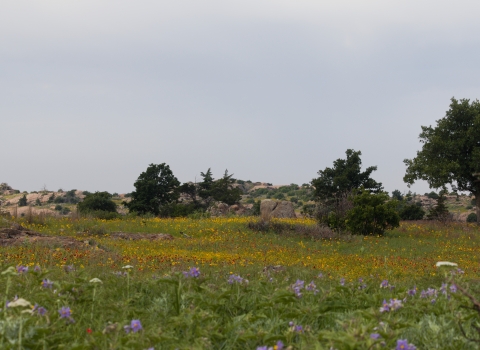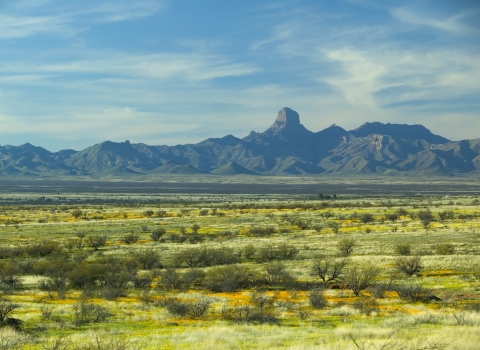Press Release
U.S. Continues to Demonstrate Leadership on Elephant Conservation
WASHINGTON, D.C. -The United States was successful in maintaining a moratorium on any further ivory sales under the convention. Through intense bi-lateral discussions, the United States delegation helped shape the debate on three important proposals addressing the conservation of African elephants.
The U. S. continued its efforts started at CoP 14 to ensure that no additional ivory sales take place until such time as the biological data are available to determine if such sales contribute to the poaching of elephants for ivory. The 38 African elephant range countries are split on whether or not there is a correlation between actions taken by CITES and the poaching of elephants. After a full day of discussions, the Parties did not adopt any of the African elephant proposals.
While the U. S. understood the consensus of the Parties that they are not ready to consider elephant proposals to downlist populations to Appendix II at this time, it commended Zambia for its efforts to manage its elephant populations sustainably and believes that populations should be downlisted when they meet the criteria.
The U. S. supported a proposal from the Republic of Zambia, once they amended their proposal to remove a component involving ivory sale. The U. S. believes that Zambia meets the biological criteria and has sufficient enforcement and safety mechanisms in place to downlist their elephant population from Appendix I to Appendix II. If adopted the downlisting would have allowed trade in hunting trophies for non-commercial purposes; trade in live animals to appropriate and acceptable destinations; and trade in raw hides. In addition, Zambia requested an increase in its sport-hunting quota, from 20 elephants per year, established in 2005, to 120 elephants per year, which is a sustainable number relative to the current population of elephants in the country. Although the U. S. expressed its support, the proposal was not adopted by a vote of 55 in support, 36 opposed and 40 abstentions, lacking the 2/3rds votes needed for adoption.
The U. S. opposed the proposal from the United Republic of Tanzania to downlist their elephant population from Appendix I to Appendix II. The U. S. had concerns about the biological information presented by Tanzania to support its downlisting proposal and most importantly did not believe that necessary enforcement and safety measures are in place. This proposal was not adopted by a vote of 59 in support, 60 opposed, and 13 abstentions.
Several of the West and Central African range states proposed a 20 year moratorium on any further consideration of elephant proposals under CITES. While the US was sympathetic to the intent of such a proposal, it could not support any proposal that would limit a Parties
The U. S. continued its efforts started at CoP 14 to ensure that no additional ivory sales take place until such time as the biological data are available to determine if such sales contribute to the poaching of elephants for ivory. The 38 African elephant range countries are split on whether or not there is a correlation between actions taken by CITES and the poaching of elephants. After a full day of discussions, the Parties did not adopt any of the African elephant proposals.
While the U. S. understood the consensus of the Parties that they are not ready to consider elephant proposals to downlist populations to Appendix II at this time, it commended Zambia for its efforts to manage its elephant populations sustainably and believes that populations should be downlisted when they meet the criteria.
The U. S. supported a proposal from the Republic of Zambia, once they amended their proposal to remove a component involving ivory sale. The U. S. believes that Zambia meets the biological criteria and has sufficient enforcement and safety mechanisms in place to downlist their elephant population from Appendix I to Appendix II. If adopted the downlisting would have allowed trade in hunting trophies for non-commercial purposes; trade in live animals to appropriate and acceptable destinations; and trade in raw hides. In addition, Zambia requested an increase in its sport-hunting quota, from 20 elephants per year, established in 2005, to 120 elephants per year, which is a sustainable number relative to the current population of elephants in the country. Although the U. S. expressed its support, the proposal was not adopted by a vote of 55 in support, 36 opposed and 40 abstentions, lacking the 2/3rds votes needed for adoption.
The U. S. opposed the proposal from the United Republic of Tanzania to downlist their elephant population from Appendix I to Appendix II. The U. S. had concerns about the biological information presented by Tanzania to support its downlisting proposal and most importantly did not believe that necessary enforcement and safety measures are in place. This proposal was not adopted by a vote of 59 in support, 60 opposed, and 13 abstentions.
Several of the West and Central African range states proposed a 20 year moratorium on any further consideration of elephant proposals under CITES. While the US was sympathetic to the intent of such a proposal, it could not support any proposal that would limit a Parties


